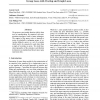Free Online Productivity Tools
i2Speak
i2Symbol
i2OCR
iTex2Img
iWeb2Print
iWeb2Shot
i2Type
iPdf2Split
iPdf2Merge
i2Bopomofo
i2Arabic
i2Style
i2Image
i2PDF
iLatex2Rtf
Sci2ools
128
click to vote
ICML
2009
IEEE
2009
IEEE
Group lasso with overlap and graph lasso
We propose a new penalty function which, when used as regularization for empirical risk minimization procedures, leads to sparse estimators. The support of the sparse vector is typically a union of potentially overlapping groups of covariates defined a priori, or a set of covariates which tend to be connected to each other when a graph of covariates is given. We study theoretical properties of the estimator, and illustrate its behavior on simulated and breast cancer gene expression data.
Related Content
| Added | 17 Nov 2009 |
| Updated | 17 Nov 2009 |
| Type | Conference |
| Year | 2009 |
| Where | ICML |
| Authors | Laurent Jacob, Guillaume Obozinski, Jean-Philippe Vert |
Comments (0)

